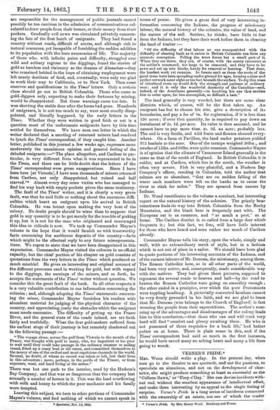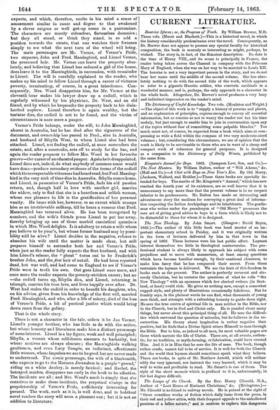VERNER'S PRIDE.*
Mas. WOOD should write a play. In the present day, when men go to the theatre to see spectacle, and not the passions, to speculate on situations, and not on the development of char- acter, she might produce something at least as successful as the "Colleen Bawn," or "Peep o'Day." She can devise incidents with- out end, without the smallest appearance of intellectual effort, and make them interesting by an appeal to the single feeling of surprise. Verner's Pride is a long series of incidents connected with the ownership of an estate, not one of which the reader
•
Verne?: Pride. By Mrs Henry Wood. Bradbury and Evans.
expects, and which, therefore, excite in his mind a sense of amusement similar in cause and degree to that awakened by a clever enigma or well got-up scene in a pantomime.
The characters are mostly colourless, flavourless dummies ; but they all stand, or think they stand, in so odd a position towards the estate, that one watches their fortunes simply to see what the next turn of the wheel will bring. The main personages are Mr. Verner, of Verner's Pride, two stepsons, John and Fred. Massingbird, and Lionel Verner, the presumed heir. Mr. Verner can leave the property abso- lutely, and believing that Lionel has seduced a girl of the house, does leave it to the Massingbirds, in succession, with remainder to Lionel. The will is carefully explained to the reader, who makes up his mind to follow Lionel through a career of virtuous poverty, terminating, of course, in a great inheritance. Con- sequently, Mrs. Wood disappoints him, for Mr. Verner at the eleventh hour makes his lawyer draw up a codicil, which is regularly witnessed by his physician, Dr. West, and an old friend, and by which he bequeaths the property back to his disin- herited nephew. Lionel therefore is again wealthy, but the testator dies, the codicil is not to be found, and the victim of circumstances is once more a pauper.
Verner's Pride belongs, under the will, to John Massingbird, absent in Australia, but he has died after the signature of the document, and ownership has passed to Fred., also in Australia, and husband of Sibylla West, to whom Lionel also had been attached. Lionel, not finding the codicil, at once surrenders the estate, and, after a sunstroke, sets off' to study for the bar, and again the reader prepares to follow Mrs. Wood in her favourite groove—the career of an educated pauper. Again he is disappointed.
Lionel does not, indeed, do what anybody of common sense would have done—produce secondary evidence of the terms of the codicil which three respectable witnesses had heard read, but Fred. Massing- bird in the very nick of time dies in Australia. Sibylla comes home, and Lionel, in possession of Verner's Pride, feels his old passion return, and, though half in love with another girl, marries the widow, only to find that she is a heartless and selfish woman, whose one pleasure in life is the gratification of her personal vanity. He bears with her, however, to an extent which stamps him as an irretrievable milksop, till he hears a rumour that Fred.
Massingbird has returned alive. He has been recognized by numbers, and the wife's friends press Lionel to put her away, thereby bringing up one of those morbid casuistical questions in which Mrs. Wood delights. Is it adultery to retain a wife whom you believe to be your's, but whose former husband may by possi- bility still be alive ? Lionel decides in the negative, refuses to abandon his wife until the matter is made clear, but still prepares himself to surrender both her and Verner's Pride, when just as the reader fully expects the first husband, and with
him Lionel's release, the " ghost " turns out to be Frederick's brother John, and the first heir of entail. He had been reported
dead, but was well, and had come to England to see if Verner's Pride were in truth his own. Out goes Lionel once more, and once more the reader expects the poverty-stricken career; but no —the codicil turns up, Sibylla dies, and Lionel, returning in triumph, marries his true love, and lives happily ever after. Dr. West had stolen the codicil in order to benefit his daughter, who, on his advice, given from his knowledge of the first will, married Fred. Massingbird, and who, after a life of misery, died of the loss of 'Verner's Pride, a bit of poetical justice which would bring down roars from the gallery.
That is the whole story.
There is not a character in the tale, unless it he Jan Veiner, Lionel's younger brother, who has little to do with the action, but whose honesty and literalness make him a distinct personage of some interest. Lionel is a lay figure, weak and well principled; Sibylla, a woman whose selfishness amounts to barbarity, but whose motives are always obscure ; the Massingbirds walking gentlemen, and even Lucy Temple, an indistinct, affectionate little woman, whose impulses we see to be good,but are never made to understand. The comic personage, the wife of a blacksmith, who expects to go to the Mormon Jerusalem in a purple " gownd,"
riding on a white donkey, is merely farcical ; and Rachel, the betrayed maiden, disappears too early in the book to be effective.
The incidents are all ; and Mrs. Wood's merit is simply that she contrives to make these incidents, the perpetual change in the proprietorship of Verner's Pride, sufficiently interesting for
perusal. The work, such as it is, is well done, and to habitual novel readers the story will seem a pleasant one ; but it is not an addition to literature.































 Previous page
Previous page